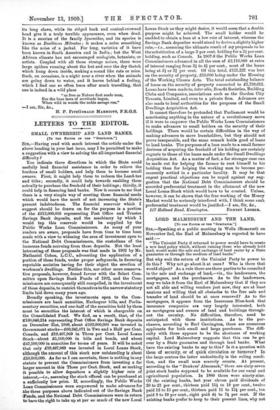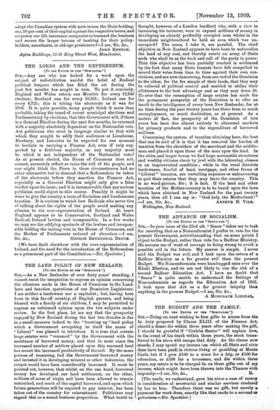LORD MALMESBURY AND THE LAND.
[TO THE EDITOR OF THY "SPROTATOR...]
SIR,—Speaking at a public meeting in Wells (Somerset) on November 2nd, the Earl of Malmesbury is reported to have
said :- " The Unionist Party if returned to power would have to create a new land policy which, without ruining those who already hold land, would make the sale and exchange of land easier by a State guarantee or through the medium of land banks."
But why wait the return of the Unionist Party to power to do this ? Why not go about it at once P Who is there that would object? As a rule there are three parties to be consulted in the sale and exchange of land,—viz., the landowners, the mortgagees, and the purchasers. As to the landowners, may we take it from the Earl of Malmesbury that if they are not all able and willing vendors just now, they are at least anxious and willing that all obstacles to the free sale and transfer of land should be at once removed? As to the mortgagees, it appears from the Insurance Blue-book that insurance companies aro very largely interested, both as mortgagees and owners of land and buildings through- out the country. No difficulties, therefore, need be anticipated with these institutions. As to the pur- chasers, according to Earl Carrington, there are numerous applicants for both small and large purchases. The diffi- culty with these appears to be the shortness of working capital. Lord Malmesbury suggests that this can be got over by a State guarantee and through land banks. What have the existing banks to say to this ? Is it a question with
them of security, or of quick circulation or turnover ? In the large centres the latter undoubtedly is the ruling condi-
tion, and the small man scarcely counts. At present, according to the " Bankers' Almanack," there are sixty-seven joint stook banks supposed to be available for our rural and agricultural population. In 1880 there were ninety-nine. Of the existing banks, last year eleven paid dividends of 20 to 22 per cent., thirteen paid 1511 to 19 per cent., twelve paid 13 to 15 per cent., thirteen paid 11 to 121 per cent., ten paid 8 to 10 per cent., eight paid 41 to 71 per cent. If the existing banks prefer to keep to their present lines, why not adopt the Canadian system with note issues, the State holding, say, 50 per cent. of their capital against the respective issues, and empower our life insurance companies to transact the business and secure the larger income of banking for their policy- holders, annuitants, or old-age pensioners P—I am, Sir, &c.,
JOHN RENTON.
Aytcrn Buildings, 21-25 King Street West, Manchester.















































 Previous page
Previous page